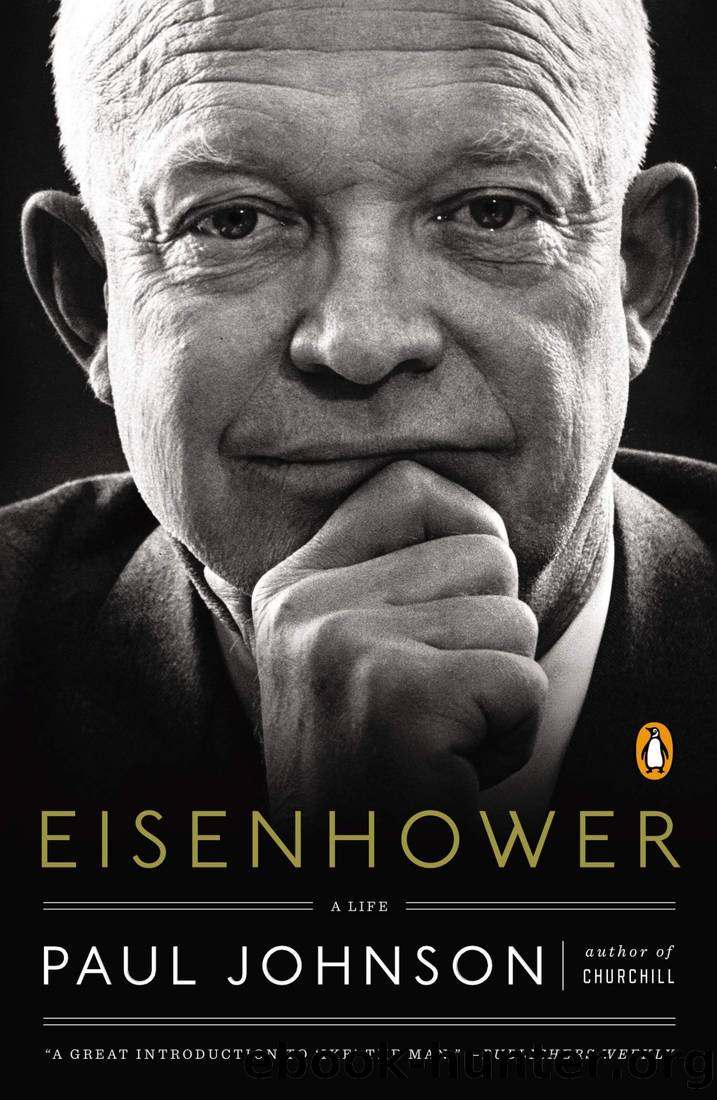Eisenhower: A Life by Paul Johnson

Author:Paul Johnson
Language: eng
Format: azw3, epub, mobi
Tags: Biography & Autobiography, Military, Presidents & Heads of State, World War II, History
ISBN: 9780143127390
Publisher: Penguin
Published: 2015-08-08T06:40:39.319000+00:00
PART FIVE
A Fair Campaign for the White House
Given the American tradition of electing successful generals as presidents—a tradition formed by George Washington, Andrew Jackson and Ulysses S. Grant—there was always a strong chance, some would rate it a certainty, that Ike would run. He said no many times. Did he mean it? Who can say? He did, and he did not. He disliked political generals. He disliked putting himself forward. He once said: “I want to be as unlike Douglas MacArthur as possible.” He might have said the same about George Patton. Ike must have known he had remarkable qualities, including those well suited for high office in the civilian sphere. But he was overwhelmingly eager that they should be “discovered,” rather than presented by himself, something inseparable from running for the White House. It was not so much a question of seeking the limelight. Ike never did that. It was, rather, waiting for the limelight to come to him.
On the other hand, he had an unspoken rule that he must never decline when duty unmistakably called. The United States at midcentury was unarguably the most powerful nation on earth. It was the largest petroleum producer in the world and supplied more oil than the rest of the world’s nations together. It harvested one third of the world’s grain and half its cotton. It was the world’s largest producer of phosphates, iron ore, zinc, lead, copper, salt and precious metals, including uranium. It had 90 percent of the world’s natural gas production. In metals, the United States outproduced the combined output of Germany, the USSR, Venezuela, Japan, France, Iran, Poland, Britain, the Netherlands, India, Burma and Belgium. Its production of minerals was four times that of the second largest producer, the Soviet Union, and larger than the combined output of the seven major producers. Almost half of the world’s manufactured goods came from the United States. Between 1940 and 1945, the American gross national product doubled, and the ranks of the U.S. Army increased to 8.2 million, with more than 12 million on active duty in all the services. This was more than Russia or the entire British Empire. On January 1, 1946, the U.S. Navy had 70,579 ships, a much larger navy than the entire rest of the world combined, comprising 13,828,000 tons. There were 72,726 planes in the U.S. Air Force, plus 40,000 in the Navy, far more than the rest of the world could muster. All this power was centered in the White House, and effectively wielded by the president, the one man in the nation for whom everyone had the power to vote. It was inconceivable to Ike that a clear call to run for this incomparable office could be resisted.
By the beginning of the 1950s, this call was increasingly insistent and from a variety of quarters. Hitherto, entries in Ike’s diaries had been consistently negative: “I will not run under any circumstances.” From 1950 the tone changed. The Truman administration fell into deep disrepute. The Republican Party appeared the prisoner of a diehard faction headed by Senator Robert A.
Download
Eisenhower: A Life by Paul Johnson.epub
Eisenhower: A Life by Paul Johnson.mobi
This site does not store any files on its server. We only index and link to content provided by other sites. Please contact the content providers to delete copyright contents if any and email us, we'll remove relevant links or contents immediately.
| Afghan & Iraq Wars | American Civil War |
| American Revolution | Vietnam War |
| World War I | World War II |
Waking Up in Heaven: A True Story of Brokenness, Heaven, and Life Again by McVea Crystal & Tresniowski Alex(37004)
Empire of the Sikhs by Patwant Singh(22173)
We're Going to Need More Wine by Gabrielle Union(18074)
Hans Sturm: A Soldier's Odyssey on the Eastern Front by Gordon Williamson(16638)
Leonardo da Vinci by Walter Isaacson(11903)
The Radium Girls by Kate Moore(10908)
Educated by Tara Westover(7063)
Tools of Titans by Timothy Ferriss(6950)
How to Be a Bawse: A Guide to Conquering Life by Lilly Singh(6693)
The Last Black Unicorn by Tiffany Haddish(5075)
Permanent Record by Edward Snowden(4999)
The Rise and Fall of Senator Joe McCarthy by James Cross Giblin(4846)
Promise Me, Dad by Joe Biden(4449)
The Wind in My Hair by Masih Alinejad(4424)
The Crown by Robert Lacey(4105)
A Higher Loyalty: Truth, Lies, and Leadership by James Comey(4033)
The Iron Duke by The Iron Duke(3639)
Joan of Arc by Mary Gordon(3259)
How to be Champion: My Autobiography by Sarah Millican(3186)
